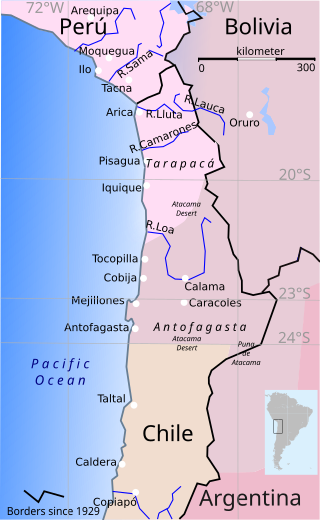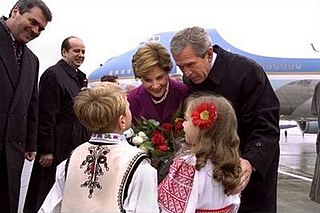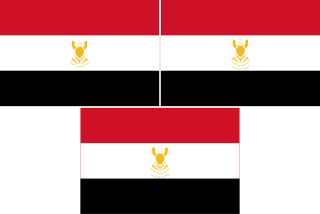Ronald Bruce St. John (born 1943), also known as R. Bruce St. John, is an American historian and writer on international relations, an affiliate professor of Bradley University.
St. John graduated from Knox College, Illinois, in 1965. [1] In 1970, he graduated Ph. D. from the University of Denver with a thesis on Peruvian foreign policy, 1919 to 1939. [2]
From 1973 to 2001, St. John was an executive of Caterpillar Inc. From the 1980s, he also wrote articles and books, especially on Libya and South American history. [3] He ended his career with Caterpillar as Head of Far East Operations, [1] then became an affiliate professor of Bradley University and a member of the board of trustees of Knox College. He is a director of Hindustan Power Plus Ltd., the International Marine Certification Institute, and the Illinois Stewardship Alliance. [3] In 1995, he was a member of the Siam Society. [4]
In April 2003, St. John gave a lecture entitled "Out With the Old, In With the New: The Bush Administration and the Middle East". [5] In May 2004, he wrote an article for Foreign Policy in Focus entitled "Bush policies make terrorism a growth industry", in which he stated that in its "war on terrorism" the White House was "not interested in the historical, political, economic and cultural factors that shape regional dissident groups" and that "Regional terrorist groups are invariably portrayed as having been co-opted by al-Qaeda and subject to its command and control." [6] In October 2004, St. John observed that
The Bush administration does not appear to have learned any lessons from the Iraq imbroglio. The White House is now busy pursuing the same bellicose policies in Iran and Syria that led to the invasion of Iraq. [7]
St. John has served on the Atlantic Council’s Working Group on Libya and the International Advisory Board of the Journal of Libyan Studies; in 2015 he was a consultant to the Department of State, the National Intelligence Council, Al Jazeera International, Associated Press, the BBC World Service, CNN News, National Geographic Magazine , NBC News, The New York Times , and The Washington Post . [8]
In 2016, St. John was the keynote speaker at a United States Naval Special Warfare Command conference on terrorism in Libya, and later that year at a trial in Norway he gave expert evidence on corruption in Libya during the time of Qaddafi. [9] A new edition of his Libya: From Colony to Revolution was reviewed in 2018 as "essential reading for those seeking a greater understanding of this complex North African state". [10]
St. John is married. He has two sons and grandchildren. [9]

The foreign relations of Libya under Muammar Gaddafi (1969–2011) underwent much fluctuation and change. They were marked by severe tension with the West and by other national policies in the Middle East and Africa, including the Libyan government's financial and military support for numerous paramilitary and rebel groups.

Muammar Muhammad Abu Minyar al-Gaddafi, also known as Colonel Gaddafi, was a Libyan politician, revolutionary, and political theorist. He was the de facto leader of Libya from 1969 to 2011, first as Revolutionary Chairman of the Libyan Arab Republic from 1969 to 1977 and then as the Brotherly Leader of the Great Socialist People's Libyan Arab Jamahiriya from 1977 to 2011. Initially ideologically committed to Arab nationalism and Arab socialism, he later ruled according to his own Third International Theory.
The Project for the New American Century (PNAC) was a neoconservative think tank based in Washington, D.C., that focused on United States foreign policy. It was established as a non-profit educational organization in 1997, and founded by William Kristol and Robert Kagan. PNAC's stated goal was "to promote American global leadership." The organization stated that "American leadership is good both for America and for the world," and sought to build support for "a Reaganite policy of military strength and moral clarity."

The War of the Pacific, also known as the Saltpeter War and by multiple other names, was a war between Chile and a Bolivian–Peruvian alliance from 1879 to 1884. Fought over Chilean claims on coastal Bolivian territory in the Atacama Desert, the war ended with a Chilean victory, which gained for the country a significant amount of resource-rich territory from Peru and Bolivia.

In the first Gulf of Sidra incident, 19 August 1981, two Libyan Su-22 Fitters fired upon two U.S. F-14 Tomcats and were subsequently shot down off the Libyan coast. Libya had claimed that the entire Gulf was their territory, at 32° 30′ N, with an exclusive 62-nautical-mile fishing zone, which Libyan leader Muammar Gaddafi asserted as "The Line of Death" in 1973. Two further incidents occurred in the area in 1986 and in 1989.

In political science, rollback is the strategy of forcing a change in the major policies of a state, usually by replacing its ruling regime. It contrasts with containment, which means preventing the expansion of that state; and with détente, which means a working relationship with that state. Most of the discussions of rollback in the scholarly literature deal with United States foreign policy toward Communist countries during the Cold War. The rollback strategy was tried and was not successful in Korea in 1950 and in Cuba in 1961, but it was successful in Grenada in 1983. The political leadership of the United States discussed the use of rollback during the uprising of 1953 in East Germany and the Hungarian Revolution of 1956, but decided against it to avoid the risk of Soviet intervention or a major war.

The main event by far shaping the foreign policy of the United States during the presidency of George W. Bush (2001–2009) was the 9/11 terrorist attacks against the United States on September 11, 2001, and the subsequent war on terror. There was massive domestic and international support for destroying the attackers. With UN approval, US and NATO forces quickly invaded the attackers' base in Afghanistan and drove them out and the Taliban government that harbored them. It was the start of a 20-year quagmire that finally ended in failure with the withdrawal of United States troops from Afghanistan.

The Federation of Arab Republics was an unsuccessful attempt by Muammar Gaddafi to merge Libya, Egypt and Syria in order to create a unified Arab state. Although approved by a referendum in each country on 1 September 1971, the three countries disagreed on the specific terms of the merger. The federation lasted from 1 January 1972 to 19 November 1977.

The Libyan Revolutionary Command Council was the twelve-person governing body that ruled the Libyan Arab Republic from 1969 to 1977. Its chairman was Muammar Gaddafi, who had the most influence.
The United States has been involved in numerous foreign interventions throughout its history. By the broadest definition of military intervention, the US has engaged in nearly 400 military interventions between 1776 and 2019, with half of these operations occurring since 1950 and over 25% occurring in the post-Cold War period. The objectives for these interventions have revolved around economy, territory, social protection, regime change, protection of US citizens and diplomats, policy change, empire, and regime building.

Libya–United States relations are the bilateral relations between the State of Libya and the United States of America. Relations are today cordial and cooperative, with particularly strong security cooperation only after the 2012 attack on the US liaison office or mission in Benghazi. Furthermore, a Gallup poll conducted in March and April 2012 found that Libyans had "among the highest approval" of US leadership in the entire Middle East and North Africa region.

Peru and the United States established relations on May 2, 1826, following Peru's independence from Spain.

The Boundary Treaty of 1866 between Chile and Bolivia, also called the Mutual Benefits Treaty, was signed in Santiago de Chile on August 10, 1866, by the Chilean Foreign Affairs Minister Alvaro Covarrubias and the Bolivian Plenipotentiary in Santiago Juan R. Muñoz Cabrera. It drew, for the first time, the border between both countries at the 24° South parallel from the Pacific Ocean to the eastern border of Chile and defined a zone of bipartite tax collection, the "Mutual Benefits zone", and tax preferences for articles from Bolivia and Chile.
The Day of Revenge was a Libyan holiday celebrating the expulsion of Italians from Libyan soil in 1970. Some sources also claim that the 1948-67 departure of Libyan Jews was also celebrated.

Frederic Wehrey is an American scholar of Middle East affairs, expert on Libyan and Gulf politics, and Senior Fellow at the Middle East Program at the Carnegie Endowment for International Peace. Wehrey earned a PhD in international relations from Oxford University.

Ireland–Libya relations began in 1977. Ireland is accredited to Libya from its embassy in Rome, Italy. Libya is accredited to Ireland from its embassy in London, United Kingdom.
Political hypocrisy or hypocrisy in policy refers to any discrepancy between what a political party claims and the practices the party is trying to hide. Modern political debate is often characterized by accusations and counter-accusations of hypocrisy.